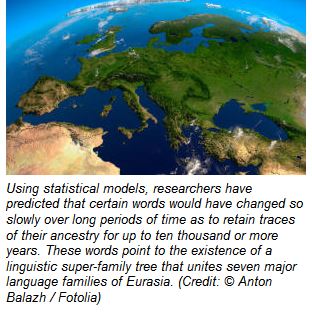Ice Age Ancestors Might Have Used Words in Common With Us
[Source: Science Daily]

New research from the University of Reading shows that Ice Age people living in Europe 15,000 years ago might have used forms of some common words including I, you, we, man and bark, that in some cases could still be recognized today.
Using statistical models, Professor of Evolutionary Biology Mark Pagel and his team predicted that certain words would have changed so slowly over long periods of time as to retain traces of their ancestry for up to ten thousand or more years. These words point to the existence of a linguistic super-family tree that unites seven major language families of Eurasia (seven language families: Indo-European, Uralic, Altaic, Kartvelian, Dravidian, Chuckchee-Kamchatkan and Eskimo-Aleut).
Read the Rest of this Article on Science Daily
PediaStaff is Hiring!
All JobsPediaStaff hires pediatric and school-based professionals nationwide for contract assignments of 2 to 12 months. We also help clinics, hospitals, schools, and home health agencies to find and hire these professionals directly. We work with Speech-Language Pathologists, Occupational and Physical Therapists, School Psychologists, and others in pediatric therapy and education.
